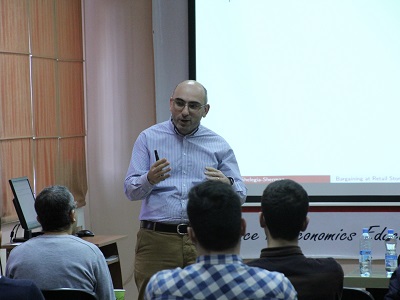On February 19, Sandro Shelegia, an Associate Professor of Pompeu Fabra University, presented to the ISET community a study by Joshua Sherman and himself entitled “Bargaining at Retail Stores: Evidence from Vienna”.
The Associate Professor discussed the step-by-step procedures researchers had to follow to collect reliable data, and the theoretical bases upon which the truthfulness of the analyses strongly depended. The former stage posed major challenge for Shelegia and Sherman as the data they needed — such as the name, scale, and profile of the shop, the price range of the goods sold, etc. — was not available (in a structured form) in any of the existing databases. To tackle the problem, the researchers trained 12 RAs, and identified nearly 300 different retail shops throughout Vienna, Austria, and constructed the valuable database themselves.
The authors of the study refined the self-made database and applied the econometric model to list the factors that influence the retail shop’s preferred mechanism of trade. Backed by empirical evidence, Shelegia and Sherman found that the likelihood of obtaining a discount was increasing in parallel with the price of the product (1) was higher for non-sale products (2) and was lower for large-scale retailers (3).
In general, the probability of the consumer being successful in the bargain process equaled 40%, while each “successful” consumer received a 10% sale on average. According to the presenter, he and his colleague found that the sale figures partly depended on the sales clerk’s characteristics, but did not vary much between the different districts of Vienna, and nor was any consumer discrimination observed.
In the closing remarks of his insightful 90-minute presentation, the Associate Professor stressed the importance of further embedding the empirical analyses into bargaining theory, shared some behind-the-scene stories, and answered questions from the audience.











